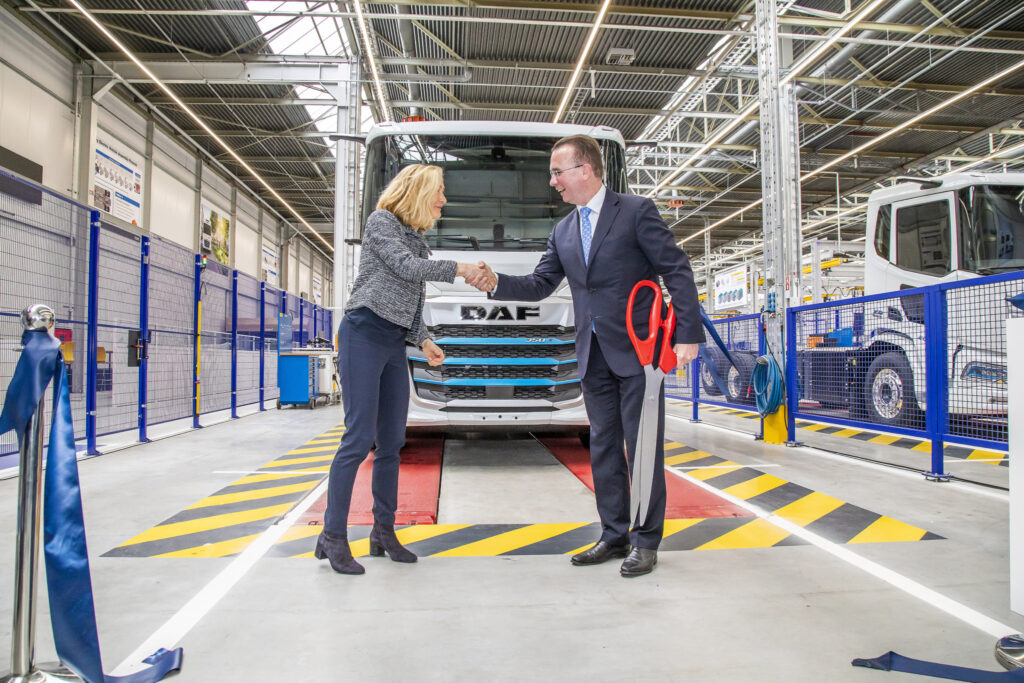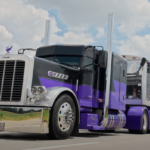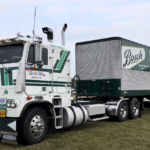Manufacturers on both sides of the Atlantic are prioritizing electrification, and Paccar is actively involved in this initiative in both regions.
DAF Trucks, which is a subsidiary of Paccar and manufactures trucks in multiple countries including the Netherlands, Belgium, Brazil, and the U.K., has recently inaugurated its assembly plant for electric trucks.
“The commissioning of the new DAF Electric Truck Assembly plant represents another important milestone on the road to an even cleaner future,” DAF Trucks president Harold Seidel said in a press release.
Starting this summer, the new DAF Trucks electric assembly plant will commence production of its XD and XF Electric models. These trucks feature Paccar electric motors and battery packages that provide 210 to 525 kWh of power, with a maximum range of 500 km. Additionally, fast charging capabilities of up to 350 kW will enable the battery to reach 80% capacity in just 45 minutes.
Electric trucks here, but cut the red tape: Scania’s Cato
Scania, a truck manufacturing company based in Sweden and operating in over 100 countries, is urging the European Union to minimize bureaucracy that it believes is hindering the implementation of electrification.
“Our message to policymakers on electrification is clear: we are ready, the vehicles are here,” spokesman Jennie Cato said in an online post that notes the OEM will begin delivering heavy-duty electric trucks later this year. (Urban models are already in series production.)
“The trucks will not be the bottleneck in the transition. What’s needed is political leadership providing enabling factors and minimizing distracting regulations along the road.”
Scania is advocating for secure access to green electricity and charging infrastructure, as well as price parity between electric and fossil-fueled transportation through CO2-based road charges and an Emission Trading System for road transportation. They are also pushing for adjustments to the scope and timelines of Euro 7 emissions controls, stating that the current framework directs significant engineering and financial resources towards internal combustion engines.
It is worth noting that Sweden currently holds the presidency of the European Union for the first half of 2023.
Volta production begins in Austria
Volta Trucks, a company that is gearing up to introduce its trucks in the United States, has begun manufacturing its 16-tonne all-electric Volta Zero at a Steyr Automotive plant in Steyr, Austria. Prototypes of the truck were successfully validated in 2022.
Initially, the newly manufactured Volta Zero trucks will be employed in a Volta Zero Driving Experience Program, which allows customers to borrow a truck for a prolonged period of time. This will enable them to understand how the medium-duty models can be integrated into their operations. Customer orders will begin to be produced in the third quarter of this year.
Steyr Automotive can build up to 14,000 Volta Trucks per year.
“In just 2.5 years, less than half the time existing truck manufacturers take, we have moved from launching a concept, through the engineering, development and quality phases and now the start of production of the final specification models that will be driven buy customers,” said Volta Trucks co-founder Kjell Waloen.
England’s Road Haulage Association fights for parking
The Road Haulage Association (RHA) in England has submitted a petition to No10 Downing Street, the official residence of the Prime Minister, urging the government to provide additional safe and secure parking for truck drivers.
Members of Parliament have signed an open letter organized by the All-Party Parliamentary Group (APPG) for Road Freight and Logistics, which emphasizes that enhanced facilities should be a central component of the government’s initiatives to recruit, train, and support commercial drivers. The Road Haulage Association (RHA) has calculated that the country requires an additional 11,000 parking spaces.
“Commercial vehicle drivers are vital to our economy so better food, toilets, showers, and somewhere safe and secure to sleep are the very least they deserve,” said Richard Smith, RHA managing director.
“A key element of the issues around driver recruitment and retention is the poor state of our roadside facilities. It is imperative the U.K. ups our game, ensuring drivers have safe, secure, comfortable, and affordable options that they know they can rely on,” said MP Greg Smith, chairman of the APPG on road freight and logistics.
The petition has gathered 20,000 supporters so far.
Tachograph tech spec’s approved
The EU Road Transport Committee has given the green light to the technical specifications for the second edition of a “transitional smart tachograph,” which will be required from August 21 to record Hours of Service, despite the absence of an upcoming satellite authentication capability.
“The new smart tachograph will bring about significant improvements, such as easier registration of border crossings and the possibility for enforcers to perform checks remotely,” said Raluca Marian, IRU director – EU advocacy.
“Signal authentication via satellite is an isolated new feature, which, albeit important, does not affect the tachograph’s main functions. We therefore welcome the determination of the European Commission and Member States to stick to the start date.”
The IRU identifies itself as the world road transport organization.





